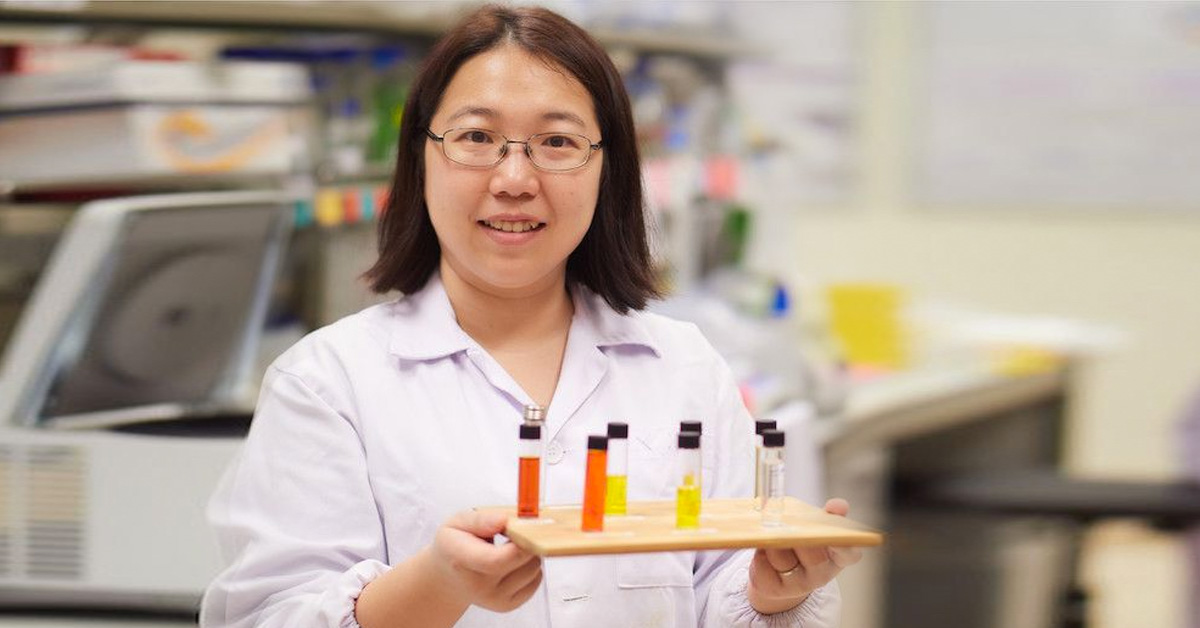BRANDED CONTENT
A*Star’s research initiative provides food for thought
Singapore researchers are whipping up lab-to-table food products and innovations that bring new meaning to nutrition and sustainability

As a child, Dr Chen Xixian's idea of fun was spending hours solving puzzles and playing pattern-recognition games.
Today, the 35-year-old applies that same fascination to food biotechnology. As a research scientist at the Agency for Science, Technology and Research (A*Star), she studies and pieces together substances and compounds that help improve people's health.
Since 2016, she has been part of the Biotransformation Innovation Platform (Biotrans) - a research programme to discover novel, sustainable biotechnology and produce high value-added ingredients for food and consumer industries within A*Star's Singapore Institute of Food and Biotechnology Innovation (SIFBI).
One of her latest puzzles was figuring out how to produce lycopene, a plant nutrient with antioxidant properties linked to health benefits ranging from improved heart health to prevention of certain types of cancers.
Lycopene is found in tomatoes and other red fruits and vegetables, but people usually need to consume more than the amount found in one serving of these fruits or vegetables to reap its benefits.
"You need to eat at least three tomatoes every day to achieve the benefits linked to lycopene," says Dr Chen.
Although tomatoes have the highest content of lycopene among other fruits and vegetables, a single tomato contains just roughly less than 10mg of lycopene.
The research scientist adds that other factors such as land scarcity and inconsistent climate conditions also affect the production of tomatoes - and thus lycopene - for mass consumption.
To increase and create a more sustainable supply of lycopene, Dr Chen and her colleagues in the Biotrans Metabolic Engineering and Enzyme Discovery group turned to biotransformation.
Biotransformation is the process of creating substances and compounds sustainably through biotechnology instead of traditional farming. It has been used to create stevia, a zero-calorie sugar substitute extracted from the leaves of the stevia plant to sweeten food and beverages.
As part of the biotransformation of lycopene, Dr Chen's team grafts tomato enzymes and genes onto microbial cells.
This mixture is then fermented in a bioreactor to extract 30g of lycopene from 1kg of these microbial cells. This is equivalent to 3,000 times the amount of lycopene produced naturally by tomatoes.
When the A*Star team is able to produce lycopene on a mass scale, it can be used to enhance food and beverages, such as tomato juice, for added health benefits, Dr Chen adds.
Beating diabetes with diet
Apart from researching cancer-fighting food, A*Star is also working closely with the healthcare sector to ramp up Singapore's war against diabetes.
In May, the International Diabetes Federation said that 14.2 per cent of Singapore's population has diabetes.
Speaking at an event to commemorate World Diabetes Day last November, former Senior Minister of State for Law and Health Edwin Tong also warned that one in three Singaporeans are at risk of developing diabetes at some stage in their life.
Though diabetes is not fatal, it can lead to irreversible complications such as heart disease, kidney failure and nerve damage.
These alarming facts and figures have driven Dr Jeannie Tay's work with the Singapore Institute for Clinical Sciences (SICS), a research arm of A*Star, where she has found that certain dietary and lifestyle changes can be as effective as medicine in preventing and managing the disease.
Dr Tay, who has been researching dietary and lifestyle interventions for diabetes prevention and treatment since 2012, focuses on precision nutrition.
The aim is to develop unique dietary plans tailored to a person's genes, metabolic profile, environment and lifestyle.
"There is no one-size-fits-all diet or exercise approach for improving health or preventing disease," says the senior research fellow.
One of her key projects is a study on prediabetes among Indians in Singapore. The study, which began in January, studies the effects of dietary and lifestyle interventions on the beta-cell function, insulin levels, and body fat distribution of 60 men and women with prediabetes.
"Indians have a two- to four-fold greater risk of developing Type 2 diabetes compared to other Asian ethnic groups and Caucasians. They also develop diabetes five to 10 years earlier," she says.
Dr Tay hopes that she will eventually find a solution to treat and reduce the incidence of diabetes, particularly in individuals disproportionately affected by the condition.
"Individuals with diabetes or at risk of diabetes, and their families are the motivation behind my research. I hope that my research findings will help improve diabetes prevention and management in Singapore and internationally."
MIND YOUR TABLE MANNERS
Having a healthy and nutritious diet is important for your health. But studies by SIFBI's Clinical Nutrition Research Centre have shown that habits at the dining table are just as crucial.
Chop blood sugar levels with chopsticks
A joint study with the SICS and the National University of Singapore (NUS) found that eating rice with chopsticks lowers a person's blood sugar level more than a spoon or hand.
When you pick up smaller quantities of rice, more time is taken to digest the carbohydrate particles, which lowers insulin production from the pancreas and reduces the risk of Type 2 diabetes.
Start the day right
Having a low glycaemic index (GI) breakfast significantly lowers blood sugar levels.
The index is a scale used to rank carbohydrates and its effect on an individual's blood sugar levels after meals.
Breakfast foods like rolled oats and multigrain bread have a low GI compared to high-GI foods, like white bread and glutinous rice.
In a two-day trial comparing the difference in blood sugar levels, A*Star found that those who consumed a low-GI breakfast had lower levels throughout the day.
Researchers arrived at two possible conclusions:
- A low-GI breakfast may be more filling, reducing the amount he eats for lunch, or;
- A low-GI breakfast reduces a spike in blood sugar and insulin levels during subsequent meals
Skip the snacks
Eating when you don't feel hungry can be detrimental, especially for the young.
A study of 158 children as part of the Growing Up in Singapore Towards healthy Outcomes (Gusto) study found that four-year-olds who ate even when they did not feel hungry were three times more likely to do so at the age of six.
The Gusto study is a collaboration between SICS, NUS, KK Women's and Children's Hospital and the National University Health System. It was started in October 2008 to study the effects of a mother's diet and lifestyle during pregnancy on their child's growth after birth.
Further research by the Gusto study has shown that children's eating rates are set at four years old. Such habits could lead to dietary-related diseases such as obesity and diabetes if carried into adulthood.
Brought to you by



